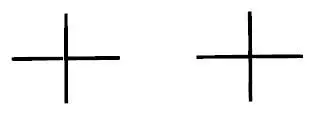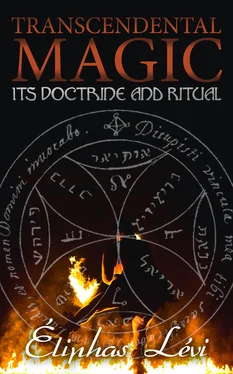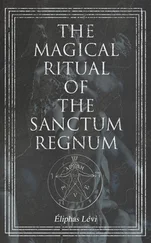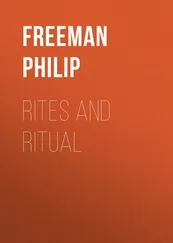
Here let us add a few words on the four magical elements and elementary spirits. The magical elements are: in alchemy, Salt, Sulphur, Mercury and Azoth; in Kabalah, the Macroprosopus, the Microprosopus and the two Mothers; in hieroglyphics, the Man, Eagle, Lion and Bull; in old physics, according to vulgar names and notions, air, water, earth and fire. But in magical science we know that water is not ordinary water, fire is not simply fire, etc. These expressions conceal a more recondite meaning. Modern science has decomposed the four elements of the ancients and reduced them to a number of so-called simple bodies. That which is simple, however, is the primitive substance properly so-called; there is thus only one material element, which manifests always by the tetrad in its forms. We shall therefore preserve the wise distinction of elementary appearances admitted by the ancients, and shall recognize air, fire, earth and water as the four positive and visible elements of Magic.
The subtle and the gross, the swift and slow solvent, or the instruments of heat and cold, constitute, in occult physics, the two positive and negative principles of the tetrad, and should be thus tabulated:
Thus, air and earth represent the male principle; fire and water are referable to the female principle, since the Philosophical Cross of pantacles, as affirmed already, is a primitive and elementary hieroglyph of the lingam of the gymnoso-phists. To these four elementary forms correspond the four following philosophical ideas Spirit, Matter, Motion, Rest. As a fact, all science is comprised in the understanding of these four things, which alchemy has reduced to three – the Absolute, the Fixed and the Volatile – referred by the Kabalah to the essential idea of God, Who is absolute reason, necessity and liberty, a threefold notion expressed in the occult books of the Hebrews. Under the names of KETHER, CHOKMAH and BINAH for the Divine World; of TIPHERETH, CHESED and GEBURAH in the moral world, and of JESOD, HOD and NETSAH in the physical world, which, together with the moral, is contained in the idea of the Kingdom or MALKUTH, we shall explain in the tenth chapter this theogony as rational as it is sublime.

Now, created spirits, being called to emancipation by trial, are placed from their birth between these four forces, two positive and two negative, and have it in their power to affirm or deny good, to choose life or death. To discover the fixed point, that is, the moral centre of the Cross, is the first problem which is given them to resolve; their initial conquest must be that of their own liberty. They begin by being drawn, some to the North, others to the South; some to the right, others to the left; and in so far as they are not free, they cannot have the use of reason, nor can they take flesh otherwise than in animal forms. These unemancipated spirits, slaves of the four elements, are those which the Kabalists call elementary daimons, and they people the elements which correspond to their state of servitude. Sylphs, undines, gnomes and salamanders really exist therefore, some wandering and seeking incarnation, others incarnate and living on this earth.
These are vicious and imperfect men. We shall return to this subject in the fifteenth chapter, which treats of enchantments and demons.
That is also an occult tradition by which the ancients were led to admit the existence of four ages in the world, only it was not made known to the vulgar that these ages are successive and are renewed, like the four seasons of the year. Thus, the golden age has passed, and it is yet to come. This, however, belongs to the spirit of prophecy, and we shall speak of it in the ninth chapter, which is concerned with the initiate and the seer. If we now add the idea of unity to the tetrad, we shall have, together and separately, the conceptions of the divine synthesis and analysis, the god of the initiates and that of the profane. Here the doctrine becomes more popular, as it passes from the domain of the abstract: the grand hierophant intervenes.
V  E
E
Table of Contents
CHOKMAH DOMUS GNOSIS
HEREUNTO we have exposed the magical dogma in its more arid and abstruse phases; now the enchantments begin; now we can proclaim wonders and reveal most secret things. The Pentagram signifies the domination of the mind over the elements, and the demons of air, the spirits of fire, the phantoms of water and ghosts of earth are enchained by this sign. Equipped therewith, and suitably disposed, you may behold the infinite through the medium of that faculty which is like the soul's eye, and you will be ministered unto by legions of angels and hosts of fiends.
But here, in the first place, let us establish certain principles. There is no invisible world; there are, however, many degrees of perfection in organs. The body is the coarse and, as it were, the perishable cortex of the soul. The soul can perceive of itself, and independently of the mediation of physical organs, by means of its sensibility and its DIAPHANE – the things, both spiritual and corporeal, which are existent in the universe. Spiritual and corporeal are simply terms which express the degrees of tenuity or density in substance. What is called the imagination within us is only the soul's inherent faculty of assimilating the images and reflections contained in the living light, being the Great Magnetic Agent. Such images and reflections are revelations when science intervenes to reveal us their body or light. The man of genius differs from the dreamer and the fool in this only, that his creations are analogous to truth, while those of the fool and the dreamer are lost reflections and bewrayed images. Hence, for the wise man, to imagine is to see, as, for the magician, to speak is to create. It follows that, by means of the imagination, demons and spirits can be beheld really and in truth; but the imagination of the adept is diaphanous, whilst that of the crowd is opaque; the light of truth traverses the one as ordinary light passes through clear glass, and is refracted by the other, as when ordinary light impinges upon a vitreous block, full of scoriae and foreign matter. That which most contributes to the errors of the vulgar is the reflection of depraved imaginations one in the other. But in virtue of positive science, the seer knows that what he imagines is true, and the event invariably confirms his vision. We shall state in the Ritual after what manner this lucidity can be acquired.
It is by means of this light that static visionaries place themselves in communication with all worlds, as so frequently occurred to Swedenborg, who notwithstanding was imperfectly lucid, seeing that he did not distinguish reflections from rays, and often intermingled chimerical fancies with his most admirable dreams. We say dreams, because dream is the consequence of a natural and periodical ecstasy which we term sleep; to be in ecstasy is to sleep; magnetic somnambulism is a production and direction of ecstasy. The errors which occur therein are occasioned by reflections from the DIAPHANE of waking persons, and, above all, of the magnetizer. Dream is vision produced by the refraction of a ray of truth. Chimerical fantasy is hallucination occasioned by a reflection. The temptation of St. Anthony, with its nightmares and its monsters, represents the confusion of reflections with direct rays. So long as the soul struggles it is reasonable; when it yields to this species of invading intoxication it becomes mad. To disentangle the direct ray, and separate it from the reflection – such is the work of the initiate. Here let us state distinctly that this work is being performed continually in the world by some of the flower of mankind; that there is hence a permanent revelation by intuition; and that there is no insuperable barrier which separates souls, because there are no sudden interruptions and no high walls in Nature by which minds can be divided from one another. All is transition and blending, wherefore, assuming the perfectibility, if not infinite at least indefinite, of human faculties, it will be understood that every person can attain to see all, and therefore to know all. There is no void in Nature: all is peopled. There is no true death in Nature: all is alive. “Seest thou that star?” asked Napoleon of Cardinal Fesch. “No, Sire.” “I see it,” said the Emperor, and he most certainly did. When great men are accused of superstition, it is because they behold what remains unseen by the crowd. Men of genius differ from simple seers by their faculty of communicating sensibly to others that which they themselves perceive, and of making themselves believed by the force of enthusiasm and sympathy. Such persons are the media of the Divine Word.
Читать дальше



 E
E










